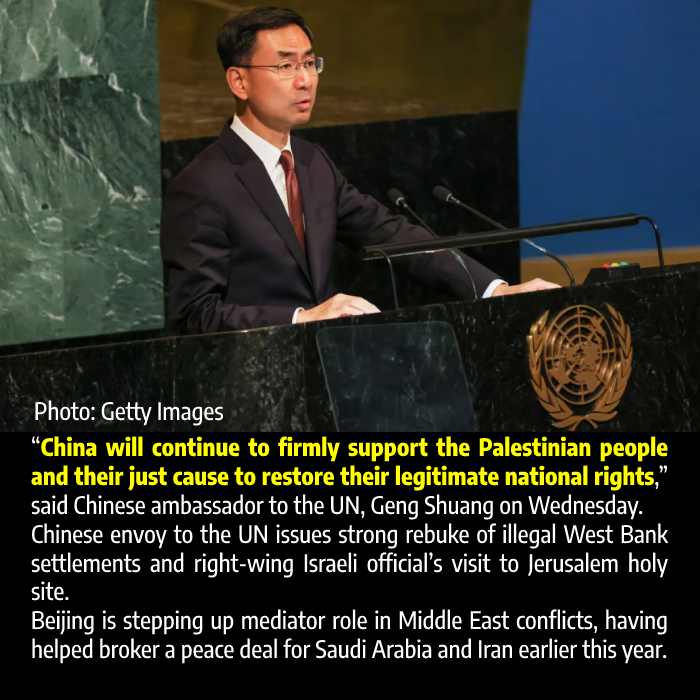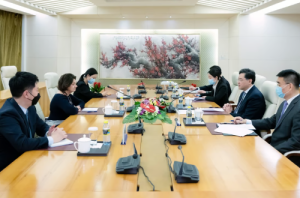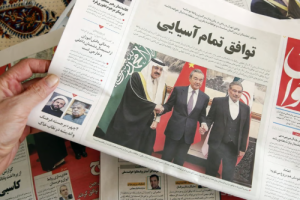By Kawala Xie.

China urged Israel to stop “provocations” and “encroachment” on Palestinian land and resources in a strong rebuke of illegal West Bank settlements and a recent holy site visit by an extremist Israeli official.
Chinese ambassador to the UN Geng Shuang called on Israel to de-escalate tensions, which have flared since the country signed an order last week paving the way for more Israeli settlements in the northern West Bank.
The situation worsened after Israel’s far-right national security minister Itamar Ben-Gvir declared the country was “in charge” during a visit to a sensitive holy site within the Al-Aqsa Mosque compound in Jerusalem. The mosque is the third-holiest site in Islam, and Palestinians consider it a national symbol.

Special envoy Zhai Jun meets UN undersecretary general for political and peacebuilding affairs, Rosemary DiCarlo, four days after talks with Arab diplomats.
It came a day after Zhai spoke to Israeli ambassador to China, Irit Ben-Abba Vitale.
READ: Middle East: China’s special envoy vows to boost cooperation with UN amid violence in West Bank
At a UN briefing on the Middle East on Wednesday, Geng said Israel must respect the historical status quo of religious holy sites in Jerusalem and immediately halt illegal expansion of settlements in the occupied territories.
He also called for an end to violence against civilians, urging Israel to lift the blockade of the Gaza Strip to guarantee the flow of people and supplies.
“Upholding the historical status quo of religious holy sites, ceasing expansion of settlements, and respecting international humanitarian law are the fundamental requirements for preventing the repeated escalations of tensions between Palestine and Israel,” he said.
“The parties concerned are duty-bound to implement them and should not use them as bargaining chips. The international community has the responsibility to ensure their implementation and should not be indifferent.”
“China will continue to firmly support the Palestinian people and their just cause to restore their legitimate national rights,” he added.
He also appeared to take aim at the United States for blocking a China-led UN Security Council statement condemning conflicts in the Gaza Strip between Israeli forces and the Palestinian Islamic Jihad group in early May.
“The country with major influence on the parties concerned should make concrete efforts to advance the Middle East peace process and should not unjustifiably prevent the Security Council from arriving at the minimum consensus on the Palestine-Israeli issue,” he said.
Several people were reportedly injured in a clash on Wednesday between Israeli settlers and Palestinians in the northern West Bank outpost of Homesh, according to the Times of Israel, as tensions continued to escalate.
China has become more vocal on the Israel-Palestine issue recently, prompting questions about whether it seeks to mediate more conflicts in the Middle East, having helped broker a peace deal for Saudi Arabia and Iran earlier this year.

The kingdom is joining as a dialogue partner weeks after Beijing helped broker a deal to normalise relations with Iran.
Diplomatic observers say the significance of the move should not be overstated, but there is scope for more cooperation in future.
READ:
Chinese Foreign Minister Qin Gang made an offer to facilitate Israeli-Palestinian peace talks during a back-to-back phone call with their foreign ministers in April.
Observers remain cautious about the offer, which had been made previously but failed to yield much progress.
China has proposed initiatives to seek a peaceful solution to the conflict, including a four-point plan proposed by President Xi Jinping in 2013, when he hosted Palestinian Authority president Mahmoud Abbas and Israeli Prime Minister Benjamin Netanyahu in separate meetings in Beijing.
Xi’s plan called for a two-state solution, ceasing of settlement activities in occupied territories, coordination of international efforts to resolve the conflict and attention to Palestine’s development.
Since 2013, a few Israeli-Palestinian peace talks have been held under Xi’s plan, but they have failed to yield substantial results.
China has provided consistent diplomatic and humanitarian support to Palestine while also maintaining close trade ties with Israel.
Kawala joined the Post in 2022 and has worked in both news and tech after graduating from Columbia Journalism School. Previously based in the US and Australia, she has worked for multiple international news outlets including Al Jazeera, SBS Australia and Shenzhen Television. She specialises in Asia affairs, breaking news reporting and video production.
Source: South China Morning Post. 26 May 2023